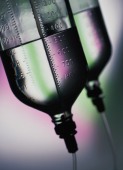
WEDNESDAY, June 4, 2014 (HealthDay News) — Severe skin infections are often treated with IV antibiotics for days. But two new drugs — given once a week, or just once — could offer an alternative, researchers report.
The findings come from two independent studies published June 5 in the New England Journal of Medicine. In one, researchers found that a single-dose IV antibiotic called oritavancin worked as well as standard antibiotic treatment among 954 patients with serious skin infections.
In the other trial, involving more than 1,300 patients, researchers tested an IV antibiotic called dalbavancin, which was given once a week for two weeks. Again, it was as effective as the standard first-choice treatment.
That standard is the long-used antibiotic vancomycin, which has to be infused twice a day, for up to 10 days. And that can mean an extended stay in the hospital.
One infectious disease expert said the new drugs could “revolutionize” the treatment of serious skin infections, by avoiding prolonged treatment.
“They’re easy to use,” said Dr. Henry Chambers, a professor of medicine at the University of California, San Francisco. “And easy is better than hard, all things being equal.”
Dr. G. Ralph Corey, the lead researcher on the oritavancin trial, agreed.
“It’s simple and it works,” said Corey, a professor of medicine and infectious diseases at Duke University in Durham, N.C.
Some patients might be able to receive an infusion of the drug and then go home, according to Corey. “With others you may need to watch them for 12 to 24 hours, to see how they do,” he said.
“Oritavancin kills [bacteria] very rapidly, so clinicians can note a response within 24 hours,” Corey said.
Oritavancin is not yet on the market, but dalbavancin is. The U.S. Food and Drug Administration approved dalbavancin on May 23, under the brand name Dalvance. So far, it is cleared only for treating bacterial infections of the skin and underlying tissue.
Many of those infections are caused by methicillin-resistant Staphylococcus aureus bacteria. That strain, often called MRSA, is considered a “superbug” because it is resistant to many existing antibiotics. Vancomycin has long been the go-to treatment for MRSA infections.
Both of the new antibiotics worked against MRSA skin infections in their respective studies. But whether they are effective for infections of other body tissue “remains to be seen,” said Chambers, who wrote an editorial that accompanied the studies.
Staph bacteria, including MRSA, can cause serious infections of the blood, bones and organs such as the heart and lungs.
Corey said the new drugs should “absolutely” be tested against those types of infections, too.
The oritavancin trial included 954 patients with wound infections (from surgery or accidents) or other skin infections that were inflamed, swollen and causing systemic symptoms like fever.
Half of the patients were randomly assigned to get one infusion of oritavancin, while the other half received IV vancomycin twice a day, for seven to 10 days. The treatments were equally effective: 80 percent of patients in each group were considered cured within a couple weeks of their last treatment.
The findings were similar in the dalbavancin trial, led by Dr. Helen Boucher of Tufts University in Boston.
There, patients received either two infusions of the drug, one week apart, or twice-daily vancomycin for at least three days. In both groups, 80 percent of patients were fever-free and showing no more growth in the skin infection within three days of starting treatment.
As for side effects, all three antibiotics caused problems such as nausea and diarrhea in a relatively small number of patients.
Chambers said longer-term safety is still a question with the new antibiotics. Both take weeks to clear from the body, he noted — and in theory, that might cause an allergic reaction or other problems in certain patients.
“We haven’t seen that in studies, where patients have been followed for 60 days,” Corey said. But, he added, once drugs are used in the real world, rare risks can emerge.
The other concern, Corey said, is that if patients are sent home soon after treatment, those who develop more-serious “deep” infections — like a blood infection — will not be caught as quickly.
Still, he and Chambers said the benefit of preventing long hospital stays could be substantial.
The actual cost savings will depend on how the drugs are priced, Corey said. But since hospitalization is so expensive, he added, the medications should cut costs.
The oritavancin study was funded by The Medicines Company, which is developing the drug; Corey said he has no financial interest in it. He was a paid consultant to the company. The dalbavancin study was funded by Durata Therapeutics; Boucher, the lead researcher, has served as an advisor to the company.
More information
The U.S. National Library of Medicine has more on skin infections.
Copyright © 2026 HealthDay. All rights reserved.

